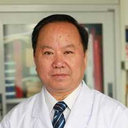Hashimoto's encephalopathy cases: Chinese experience.
关键词
抽象
BACKGROUND
Hashimoto's encephalopathy is a poorly understood syndrome consisting of heterogeneous neurological symptoms and high serum antithyroid antibody titers, typically responding to steroids. More clinical series studies are required to characterize the clinical, laboratory and imaging features, and outcomes, especially in the Chinese population.
METHODS
We analyzed the clinical, laboratory, and imaging features and outcomes of thirteen consecutive patients with Hashimoto's encephalopathy diagnosed in Xuan Wu Hospital, Beijing from 2005 to 2010 retrospectively.
RESULTS
Cognitive impairment (84.6%) and psychiatric symptoms (38.5%) were the most frequent symptoms. Seizures (30.8%) and myoclonus (7.7%) were less common than previously described. Three (23.1%) patients showed abnormal signals in hippocampus or temporal lobe, which were believed related to their memory disorders or seizures. MRI changes showed resolution paralleling clinical improvement in one patient. Among eight patients who received steroid therapy, five patients recovered, one patient improved with residual deficits, and two patients relapsed or had no effect. Among five non-steroid treated patients, three patients experienced stable remission with antiepileptic drugs or general neurotrophic therapy, and two patients experienced continuous deterioration.
CONCLUSIONS
Most patients with Hashimoto's encephalopathy showed good response to steroids. Some patients improved without steroid therapy. Considering its reversible course, we recommend that Hashimoto's encephalopathy should always be in the differential diagnosis while evaluating disorders of the central nervous system.




